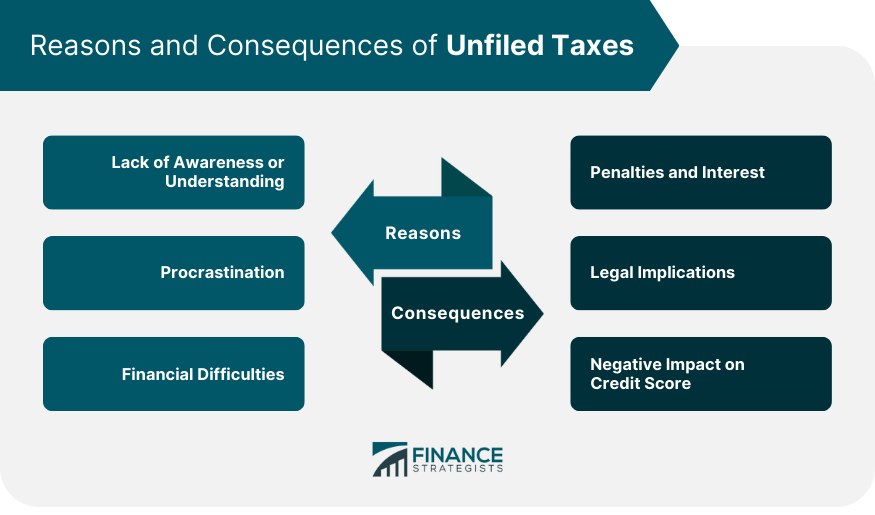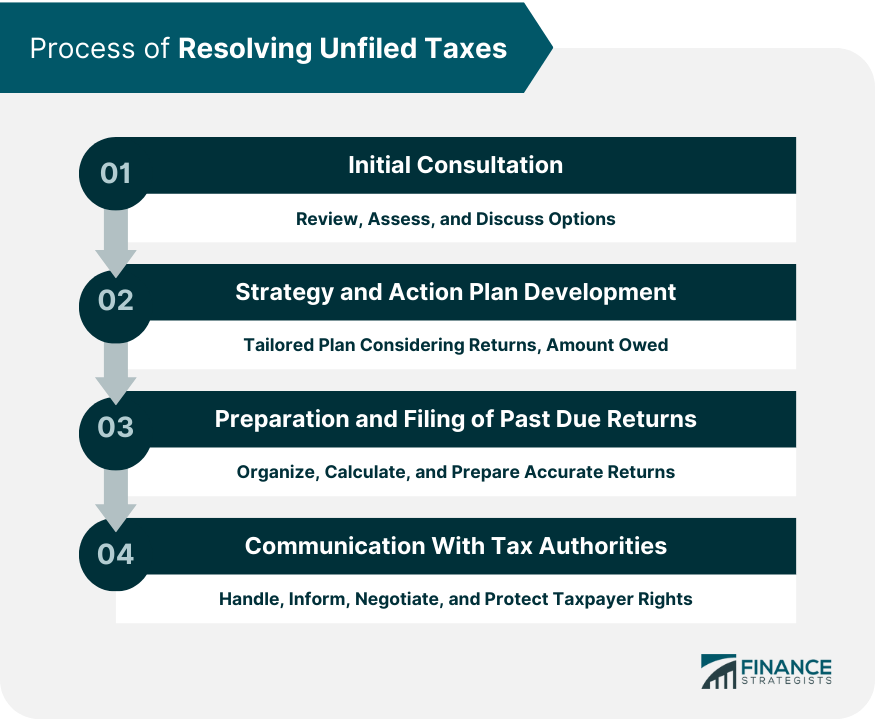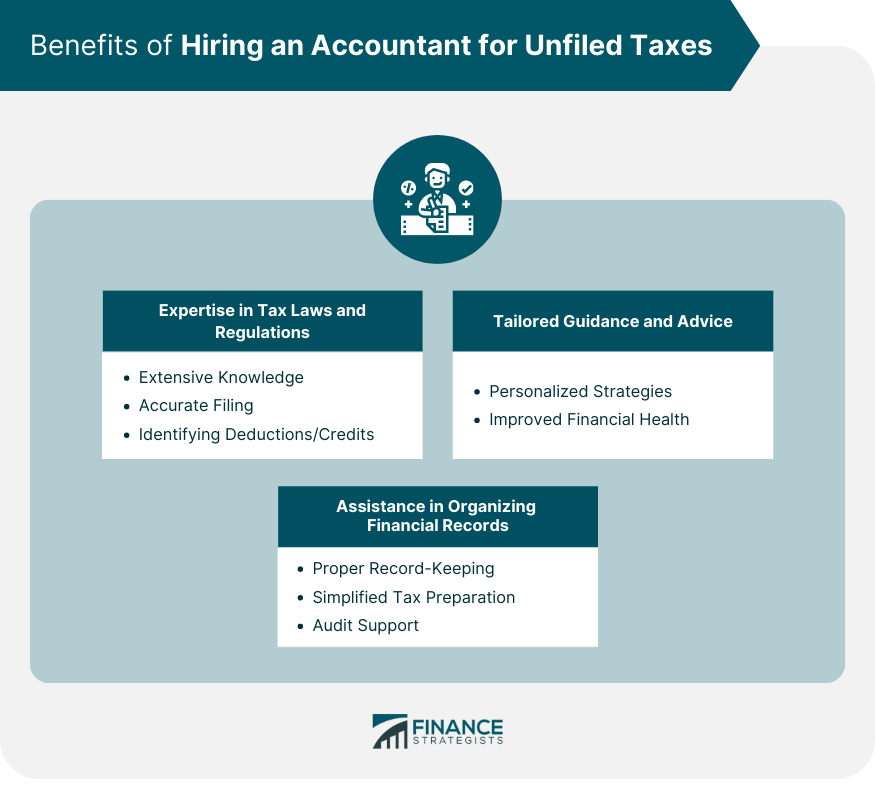Unfiled taxes refer to the tax returns that a taxpayer is obligated to file with the respective tax authorities but has not yet submitted. It is a common issue that many individuals and businesses face, often due to oversight, lack of understanding of tax laws, or deliberate evasion. The term 'unfiled taxes' denotes an individual's or a business's failure to submit the required tax returns by the deadline set by the tax authorities. It's crucial to understand that failing to file taxes is different from failing to pay taxes. In the former, you neglect or intentionally refrain from submitting your tax returns, while in the latter, you submit your tax returns but do not pay the taxes due. Accountants have an in-depth understanding of the tax system and expertise in financial record-keeping allows them to identify, strategize, and resolve unfiled tax issues effectively. Accountants not only assist in the preparation and filing of these overlooked returns but also provide crucial guidance throughout the resolution process. They negotiate with tax authorities on behalf of their clients, strive to minimize penalties and help establish payment plans if necessary. The tax code is complex and continually evolving, making it challenging for individuals and businesses to stay up-to-date and comply accurately. Often, people are unaware of their filing obligations, especially if they've had a change in their income, marital status, or other circumstances. Without proper understanding, it's easy to overlook or misinterpret these requirements, leading to unfiled tax returns. Procrastination is another common cause of unfiled taxes. Many individuals and businesses postpone filing their taxes until the very last minute, often due to the perceived complexity and time commitment involved in the process. Unfortunately, this delay can lead to missed deadlines, especially if there are unexpected issues or complications. Once a deadline is missed, it may feel easier to ignore the problem than address it, causing the issue of unfiled taxes to accumulate over time. Financial difficulties can also lead to unfiled taxes. If individuals or businesses are unable to pay their tax liability, they might avoid filing their tax returns altogether. This avoidance, however, is a misconception. Even if taxpayers cannot pay their entire tax bill, it is still beneficial to file the return. Not filing can lead to additional penalties and interest on top of the original amount due, worsening the financial situation. The most immediate consequence of unfiled taxes is penalties and interest. Tax authorities impose late filing penalties, which can significantly increase the overall tax bill. Additionally, interest is charged on both the unpaid taxes and the penalties from the due date of the return. The longer the delay in filing, the higher the cumulative interest and penalties will be, potentially adding up to more than the original tax liability. Unfiled taxes can lead to serious legal implications. If the tax authorities deem the failure to file as willful neglect or evasion, it can result in criminal charges. These charges can lead to severe penalties, including hefty fines and even imprisonment. Additionally, legal proceedings can lead to reputational damage for both individuals and businesses, which can be difficult to recover from. Unfiled taxes can have a detrimental effect on your credit score. If the tax authorities issue a tax lien due to unpaid taxes, it gets reported to credit bureaus and becomes a part of your credit history. This lien can significantly lower your credit score, making it more difficult to secure loans or credit in the future. Even after the taxes are paid, the lien can remain on your credit report for several years, continuing to affect your creditworthiness. The first step in resolving unfiled taxes is to have an initial consultation with an accountant. This professional will review your financial situation, assess the severity of the unfiled tax issue, and discuss your options. During this consultation, the accountant will likely ask for various documents, such as income statements, expense receipts, and previous tax returns. The information gathered during this stage forms the basis for the subsequent steps in the resolution process. After assessing the situation, the accountant will develop a strategy and action plan to address the unfiled taxes. This plan is tailored to your unique situation, considering factors such as the number of unfiled returns, the total amount owed, and your current financial capability. The strategy may include negotiating with tax authorities for penalty abatement, setting up a payment plan, or exploring other tax relief options. The accountant will explain this plan to you, ensuring you understand each step before proceeding. The next step is the preparation and filing of the past due returns. The accountant will organize your financial records, calculate the tax liabilities, and prepare accurate tax returns for each unfiled year. Once these returns are prepared, they will be filed with the tax authorities. Timely filing of these overdue returns is crucial to stop further accrual of penalties and interest. Throughout this process, the accountant will handle communications with the tax authorities. They will keep them informed of your efforts to resolve the unfiled taxes, negotiate as necessary, and ensure that your rights as a taxpayer are protected. Accountants understand the language and procedures of tax authorities, which can significantly reduce the stress and anxiety associated with these interactions. They ensure that all communications are timely and correctly documented, providing a smooth and efficient resolution process. One of the significant benefits of hiring an accountant for unfiled taxes is their expertise in tax laws and regulations. Accountants have extensive training and experience in the field of taxation, enabling them to navigate the complex tax system effectively. They stay updated with the latest changes in tax laws and use this knowledge to ensure accurate and compliant filing of tax returns. They can also identify potential tax deductions or credits, which could significantly reduce your tax liability. Accountants provide guidance and advice tailored to your individual situation. They take the time to understand your specific financial circumstances and goals, ensuring the tax resolution strategy aligns with them. Whether you're dealing with one year of unfiled taxes or several, an accountant can provide valuable insights and suggestions. Their personalized advice can help you avoid similar issues in the future and improve your overall financial health. Another benefit of hiring an accountant is their assistance in organizing your financial records. Proper record-keeping is essential for accurate tax filing and can also help in the case of tax audits. Accountants can guide you on what records to keep, how to organize them, and how long to retain them. This assistance can simplify your tax preparation process and provide peace of mind knowing that your financial records are in order. Hiring an accountant provides numerous benefits in the process of resolving unfiled taxes. Accountants possess expertise in tax laws and regulations, ensuring accurate and compliant filing while identifying potential deductions and credits. Their guidance and personalized advice tailored to individual situations can lead to improved financial health and future tax compliance. Additionally, accountants assist in organizing financial records, simplifying tax preparation, and providing peace of mind. The process of resolving unfiled taxes involves an initial consultation, the development of a strategy and action plan, the preparation and filing of past-due returns, as well as communication with tax authorities. With the support and expertise of an accountant, individuals, and businesses can navigate the complexities of unfiled taxes and achieve a resolution that minimizes penalties, legal implications, and negative impacts on credit scores.What Are Unfiled Taxes?
Reasons for Unfiled Taxes
Lack of Awareness or Understanding
Procrastination
Financial Difficulties
Consequences of Unfiled Taxes
Penalties and Interest
Legal Implications
Negative Impact on Credit Score

Process of Resolving Unfiled Taxes
Initial Consultation With the Accountant
Develop a Strategy and Action Plan
Preparation and Filing of Past Due Returns
Communicate With Tax Authorities

Benefits of Hiring an Accountant for Unfiled Taxes
Expertise in Tax Laws and Regulations
Guidance and Advice Tailored to Individual Situation
Assistance in Organizing Financial Records

Conclusion
Dealing With Unfiled Taxes by Your Accountant FAQs
If you don't file your taxes, you can face penalties and interest on your unpaid tax bill. Over time, these can significantly increase your overall tax liability. If the failure to file is considered willful neglect or tax evasion, you could face legal repercussions, including fines and imprisonment.
Yes, you can still file taxes if they are past due. It's always beneficial to file your taxes, even if they're late. This action can prevent further penalties and interest from accruing and begins the process of resolving your tax issue.
Yes, unfiled taxes can affect your credit score. If the tax authorities issue a tax lien due to unpaid taxes, it is reported to credit bureaus and can significantly lower your credit score.
An accountant can help with unfiled taxes by preparing and filing past-due returns, negotiating with tax authorities, developing a resolution strategy, and providing guidance tailored to your situation. They can also assist in organizing your financial records, ensuring accurate and compliant tax filing.
Generally, you should keep your financial records for three years from the date you filed your original return or two years from the date you paid the tax, whichever is later. However, if you have unfiled taxes or claimed a loss, you should keep your records longer. An accountant can provide more specific guidance based on your situation.
True Tamplin is a published author, public speaker, CEO of UpDigital, and founder of Finance Strategists.
True is a Certified Educator in Personal Finance (CEPF®), author of The Handy Financial Ratios Guide, a member of the Society for Advancing Business Editing and Writing, contributes to his financial education site, Finance Strategists, and has spoken to various financial communities such as the CFA Institute, as well as university students like his Alma mater, Biola University, where he received a bachelor of science in business and data analytics.
To learn more about True, visit his personal website or view his author profiles on Amazon, Nasdaq and Forbes.















